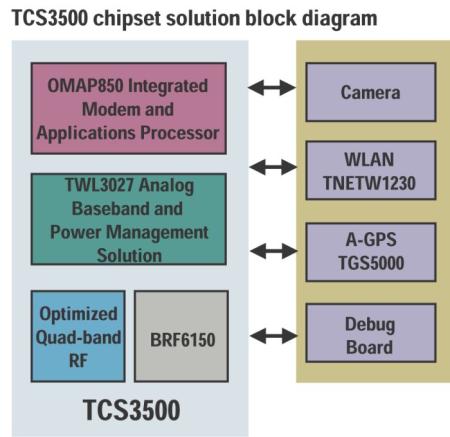“EDGE” reference design supports Linux-based mobile device apps
Jan 20, 2004 — by LinuxDevices Staff — from the LinuxDevices Archive — viewsTexas Instruments (TI) has released the first of several planned mobile phone reference design chipsets supporting the “Enhanced Data Rates for GSM Evolution” (EDGE) high-speed mobile data standard. The half-business-card sized design supports embedded Linux and other popular mobile device operating systems, and targets smartphones, feature phones, and PDAs.
TI claims its TCS3500 chipset delivers three times the data rate throughput of current GSM/GPRS devices, enabling it to support EDGE-enabled applications such as multimedia, gaming, camera functionality, and video.

TI's half-biz-card sized TCS3500 chipset, with optional modules
The chipset includes an OMAP850 processor integrated with a quad-band EDGE modem. It also includes a TWL3027, which integrates an analog baseband with power management and an audio codec, and the BRF6150 single-chip Bluetooth solution. Optional modules include the TGS5000 assisted GPS and the TNETW1230 WLAN chips.
The chipset also supports multiple third-party Java platforms, as well as OMAP processor applications from TI's OMAP Developer's Network.
The design is expected to sample in Q1, 2004, with volume available in Q4, 2004. It includes bill of materials, board design and layout, GSM/GPRS/EDGE protocol stack, and development tools.
Rick Kornfeld, vice president and general manager of TI's wireless chipset business, said, “By leveraging the proven success of predecessor OMAP730-based GSM/GPRS reference designs, we are able to offer our customers a complete smartphone reference design highly integrated with all the components required to build full-featured handsets based on the EDGE standard.”
This article was originally published on LinuxDevices.com and has been donated to the open source community by QuinStreet Inc. Please visit LinuxToday.com for up-to-date news and articles about Linux and open source.